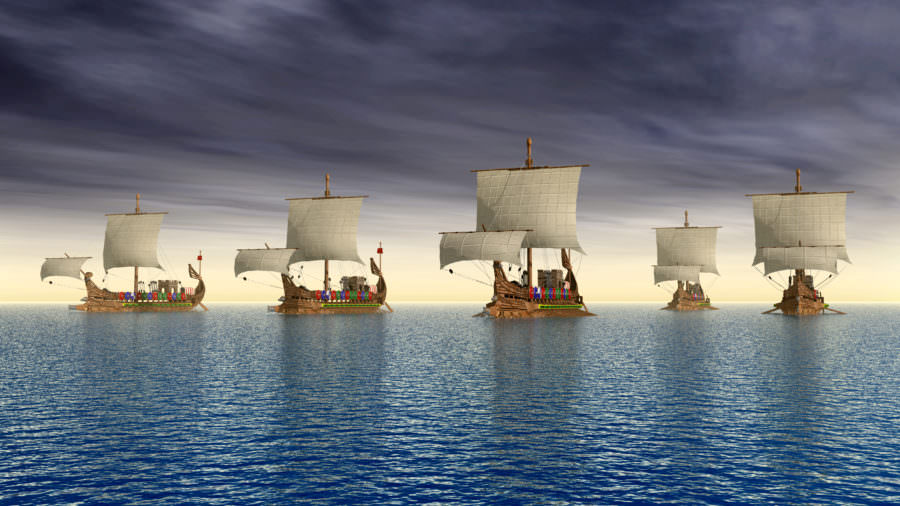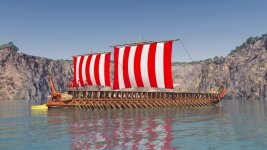Menu
Install the app
How to install the app on iOS
Follow along with the video below to see how to install our site as a web app on your home screen.
Note: This feature may not be available in some browsers.
You are using an out of date browser. It may not display this or other websites correctly.
You should upgrade or use an alternative browser.
You should upgrade or use an alternative browser.
Greek History Community
What was the naval battle style in Ancient Greece?
- Thread starter redsoxdw_
- Start date
1 - 3 of 3 Posts
k_tsoukalas
Administrator
The Navy and Army are two totally different things. Athens developed a formidable army after the First Persian Invasion and they had a unique type of ship in their fleet, as well as winning battle strategies. Here's a good article with an overview:

 www.greekboston.com
www.greekboston.com

Developing the Athenian Navy of Ancient Greece
Learn all about how the ancient Athenian Navy came about in Ancient Greece.
1 - 3 of 3 Posts
JOIN THE DISCUSSION AND READ OTHER GREEK INFO:
My Top Favorite Greek Philosophers
- paharo45
- Greek History Forum
- Replies: 1
There are too many philosophers to count, but these are the ones I am studying at the moment. It's fascinating to me how influential the Greek philosophers are. Here's some things I am learning:
#1 Socrates
If philosophy had a poster boy, Socrates might very well be it. The father of Western philosophy, Socrates was a gadfly to Athenian society, questioning everything and Master to Plato. Known for the Socratic Method and his unflinching commitment to truth, Socrates' influence is immeasurable despite never having written a word.
#2 Plato
Rightly succeeding his mentor on this list, Plato's Academy saw him birth the first "university" of its kind. His unabashed idealism, immortal Forms, allegories like the Cave, and the pursuit of 'The Good' in moral philosophy set the stage for much intellectual discourse.
#3 Aristotle
Aristotle, another of Plato's students, had a more grounded approach to philosophy than his predecessor. With establishing principles of logic and reason, and contributions to virtually every field of academia, from poetry to physics, Aristotle's body of work remains foundational.
#4 Heraclitus
Heraclitus, famed for the idea that "change is the only constant," viewed the cosmos through a lens of process, flux, and an everlasting Logos that governs the world. Although little of his work survives, his influence on ancient and modern thinkers is profound.
#5 Epicurus
Known for his eponymous philosophy, Epicurus taught that the greatest good is to seek modest pleasures in order to attain a state of tranquility, freedom from fear (ataraxia), and absence of bodily pain (aponia). Often misunderstood, Epicureanism is starkly different from the modern use of 'epicurean' - it's much less about a luxury lifestyle and more about ethical considerations regarding personal fulfillment.
#1 Socrates
If philosophy had a poster boy, Socrates might very well be it. The father of Western philosophy, Socrates was a gadfly to Athenian society, questioning everything and Master to Plato. Known for the Socratic Method and his unflinching commitment to truth, Socrates' influence is immeasurable despite never having written a word.
#2 Plato
Rightly succeeding his mentor on this list, Plato's Academy saw him birth the first "university" of its kind. His unabashed idealism, immortal Forms, allegories like the Cave, and the pursuit of 'The Good' in moral philosophy set the stage for much intellectual discourse.
#3 Aristotle
Aristotle, another of Plato's students, had a more grounded approach to philosophy than his predecessor. With establishing principles of logic and reason, and contributions to virtually every field of academia, from poetry to physics, Aristotle's body of work remains foundational.
#4 Heraclitus
Heraclitus, famed for the idea that "change is the only constant," viewed the cosmos through a lens of process, flux, and an everlasting Logos that governs the world. Although little of his work survives, his influence on ancient and modern thinkers is profound.
#5 Epicurus
Known for his eponymous philosophy, Epicurus taught that the greatest good is to seek modest pleasures in order to attain a state of tranquility, freedom from fear (ataraxia), and absence of bodily pain (aponia). Often misunderstood, Epicureanism is starkly different from the modern use of 'epicurean' - it's much less about a luxury lifestyle and more about ethical considerations regarding personal fulfillment.
History of the Greek bailouts/financial crisis?
- ssherie_
- Greek History Forum
- Replies: 0
I'm reaching out to tap into our collective knowledge regarding a significant episode in recent economic history — the Greek financial crisis and the bailouts that followed. This period, marked by severe economic downturns, austerity measures, and complex international negotiations, has had long-lasting implications not only for Greece but for the European Union as a whole. Some things:
- Origins: What were the primary causes that led to the Greek financial crisis? How did Greece's economic conditions prior to the crisis contribute to its severity?
- Bailout Measures: Could someone explain the specifics of the bailout agreements? How were the terms negotiated, and what were the conditions placed on Greece in exchange for the financial assistance?
- Impact on Greece and the EU: What have been the short and long-term effects of the bailouts on the Greek economy and its citizens? Additionally, how has this crisis influenced the policies and economic strategies within the broader European Union?
Learning about the Spartan way of life
- dimi_pat
- Greek History Forum
- Replies: 1
I find the Spartans fascinating. They seemed to have a different way of life!
The Spartans, known for their military might, also led a lifestyle that was remarkably disciplined and focused on simplicity.
The core of Spartan society was its military-oriented ethos. From a young age, Spartan boys were trained to be soldiers in the agoge, a rigorous education system that emphasized physical training, endurance, and survival skills. This preparation was not just about warfare but about creating individuals who were resilient, self-sufficient, and disciplined.
But Spartan discipline extended beyond the military sphere. Spartans lived a life of austerity and frugality that is quite alien to our modern way of living. Meals were simple, homes were unadorned, and luxuries were frowned upon. This was not out of a lack of resources but a deliberate choice to avoid softness and dependency on material comforts.
Interestingly, this Spartan simplicity also fostered a sense of equality among citizens. By eschewing luxury, Spartans aimed to reduce divisions within their society. Wealth and status were downplayed, while military prowess and moral integrity were valued above all.
What do you guys think about this or what can you add to my thinking?
The Spartans, known for their military might, also led a lifestyle that was remarkably disciplined and focused on simplicity.
The core of Spartan society was its military-oriented ethos. From a young age, Spartan boys were trained to be soldiers in the agoge, a rigorous education system that emphasized physical training, endurance, and survival skills. This preparation was not just about warfare but about creating individuals who were resilient, self-sufficient, and disciplined.
But Spartan discipline extended beyond the military sphere. Spartans lived a life of austerity and frugality that is quite alien to our modern way of living. Meals were simple, homes were unadorned, and luxuries were frowned upon. This was not out of a lack of resources but a deliberate choice to avoid softness and dependency on material comforts.
Interestingly, this Spartan simplicity also fostered a sense of equality among citizens. By eschewing luxury, Spartans aimed to reduce divisions within their society. Wealth and status were downplayed, while military prowess and moral integrity were valued above all.
What do you guys think about this or what can you add to my thinking?
Learning about Greek Independence Day
- cubrinj
- Greek History Forum
- Replies: 1
March 25th marks a significant celebration in Greece, but I realize my knowledge on its historical context is quite limited.
From what I understand, this day commemorates the start of the War of Greek Independence in 1821, where Greece sought to end several centuries of Ottoman rule. However, I'm eager to learn more about the intricacies of this period, the key figures involved, and how the struggle for independence unfolded over time.
Additionally, I'd be interested in understanding how this day is celebrated across Greece today and whether any particular traditions are tied to it. For example, are there specific ceremonies, parades, or family traditions that uniquely mark this day in Greek culture?

From what I understand, this day commemorates the start of the War of Greek Independence in 1821, where Greece sought to end several centuries of Ottoman rule. However, I'm eager to learn more about the intricacies of this period, the key figures involved, and how the struggle for independence unfolded over time.
Additionally, I'd be interested in understanding how this day is celebrated across Greece today and whether any particular traditions are tied to it. For example, are there specific ceremonies, parades, or family traditions that uniquely mark this day in Greek culture?

Athens and the creation of democracy
- mastichas09
- Greek History Forum
- Replies: 1
I've been thinking about Athens and how it's the birth of democracy. I wondered if other societies had experimented with the concepts or if Athens was unique? Does anyone know? I know that there's been some evidence that other societies experimented with community leadership, but none had a true democracy like what Athens developed.
It was unique in developing a system where a significant portion of its inhabitants could participate directly in decision-making processes. This early form of democracy was largely initiated under the leadership of Cleisthenes in 508/507 BC. His reforms reorganized the population into ten tribes based on their residence rather than lineage, promoting a broader and more inclusive political engagement.
In this Athenian democracy, citizens had the right to attend the Assembly (Ekklesia), where they could speak and vote on legislation and executive decisions. The Council of Five Hundred (Boule), selected by lot for each of the ten tribes, proposed legislation and handled daily affairs. This lottery system for public office sought to prevent power monopolies and encourage civic participation.
I know that this work truly influenced other democratic governments through the world!
Feel free to chime in with your thoughts- I find this stuff interesting.
It was unique in developing a system where a significant portion of its inhabitants could participate directly in decision-making processes. This early form of democracy was largely initiated under the leadership of Cleisthenes in 508/507 BC. His reforms reorganized the population into ten tribes based on their residence rather than lineage, promoting a broader and more inclusive political engagement.
In this Athenian democracy, citizens had the right to attend the Assembly (Ekklesia), where they could speak and vote on legislation and executive decisions. The Council of Five Hundred (Boule), selected by lot for each of the ten tribes, proposed legislation and handled daily affairs. This lottery system for public office sought to prevent power monopolies and encourage civic participation.
I know that this work truly influenced other democratic governments through the world!
Feel free to chime in with your thoughts- I find this stuff interesting.
Share and discuss Greek history!
WorldwideGreeks.com is a free online forum community where people can discuss Greek food, travel, traditions, history and mythology.
Join Worldwide Greeks here!
Join Worldwide Greeks here!
JOIN COMMUNITY FOR FREE
LOGIN TO YOUR ACCOUNT



